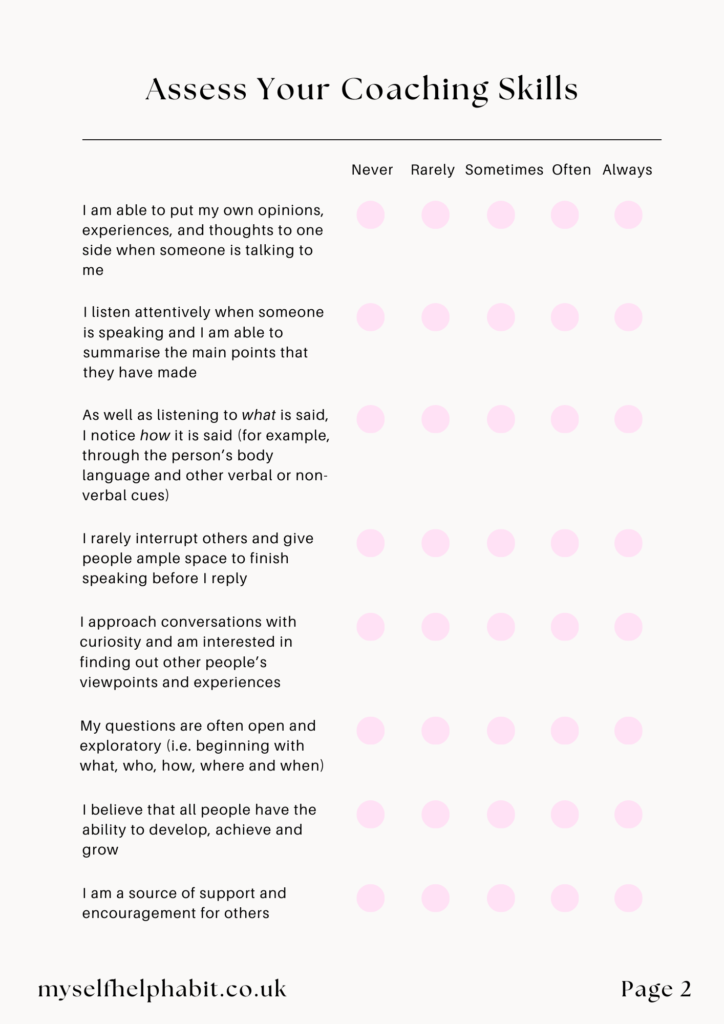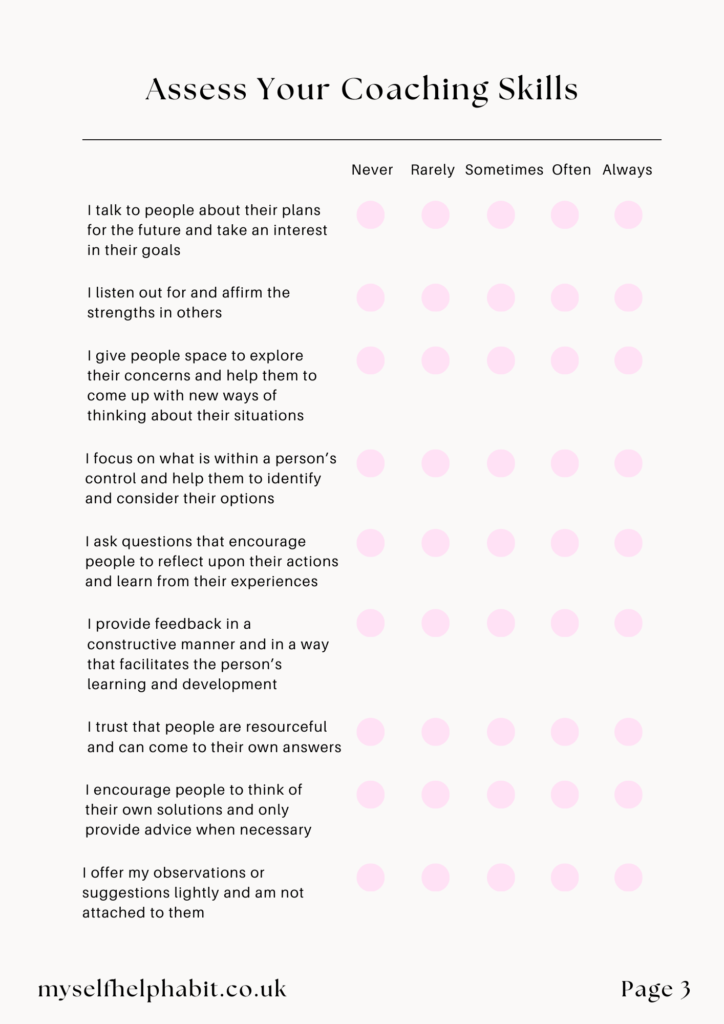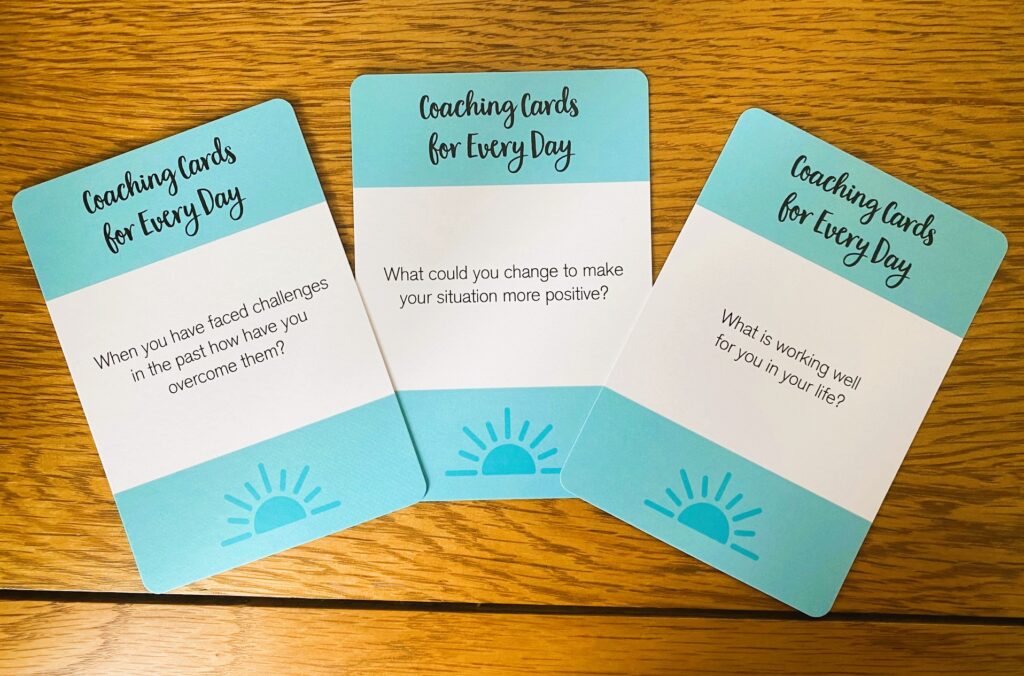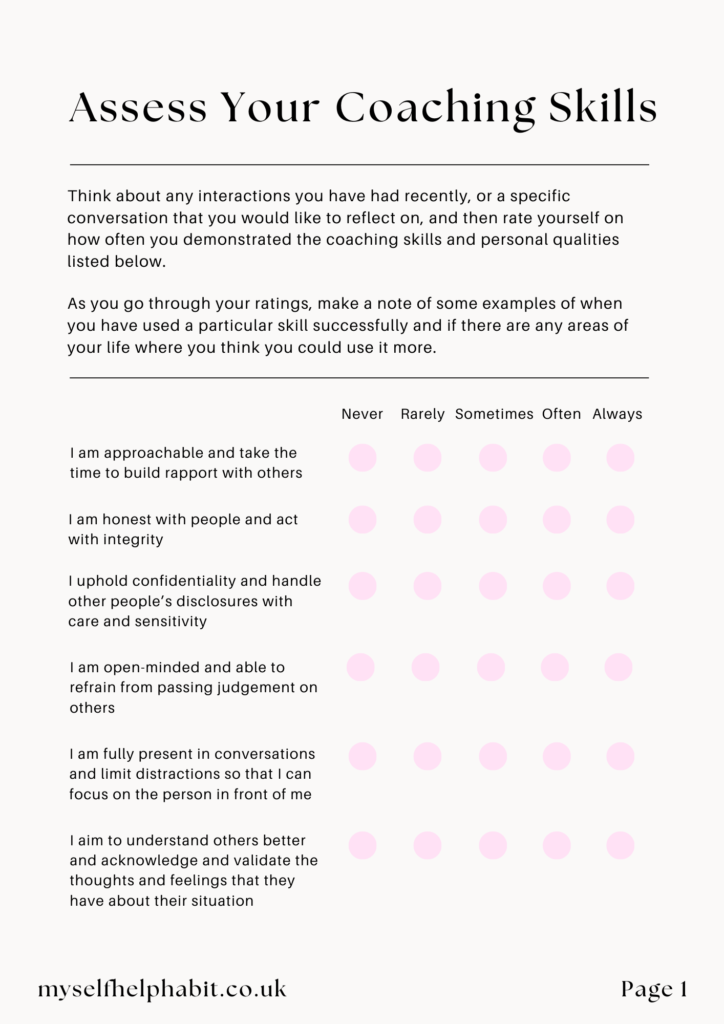
Using coaching skills in everyday conversations
Think about some of the best conversations you have ever had. What was happening between you and the other person (or people) in the conversation?
What were the most inspiring conversations you have ever had? What stands out to you about those conversations?
When have you felt like someone has really understood you? What did that person do to show their understanding?
I immediately recall a conversation that I had with my lecturer as I was nearing the end of my degree. After giving me some helpful feedback on my assignment she asked me about my plans after graduation. As I started telling her about some of options I was considering, she listened attentively and took time to understand my personal situation. She was incredibly encouraging and got me thinking about a whole host of future possibilities. While she made some suggestions as to where I could take my degree, her advice was in no way imposed on me as something that I ‘must’ follow. Most of all, I sensed that she had 100% belief in me and when I came out of her office I felt like I could do anything!
Just like in the example I have given, the chances are that, in the conversations that came to your mind, the people you were interacting with were using some coaching skills (though perhaps not intentionally).
Coaching involves having a special kind of conversation that is wholly focused on the individual and their development needs. It provides a space where the person can talk through the challenges they are facing and be listened to without interruption or judgement. As coaching is solutions-focused in nature, the person is encouraged to explore their ideas for moving forwards and commit to actions that will enable them to make positive changes in their life.
The coach’s role is to support the individual through this process and act as a thinking partner, helping the person to reflect on their situation, learn from their experiences, discover new ways to think and behave, generate their own solutions, and draw upon the resources that they need to reach their goals.
How do you use coaching skills in day to day life?
While professional coaches undertake many hours of training, practice and ongoing personal development, you don’t need to become a certified coach to use a coaching approach as you go about your day to day life. The skills that I have learned from coaching have proven to be invaluable in my personal life. In fact, coaching has now become a way of being for me! I take more time to listen to the people around me, to understand their perspectives and experiences, and ensure that I create a space where they can share their concerns with me. Instead of immediately going into ‘rescue mode’ and trying to fix situations for others, I encourage them to think about how they could resolve the issues they are facing.
Perhaps you often find yourself having the types of conversations that are suited to coaching, such as those that facilitate the development of another individual or that help somebody to work through a specific problem they are experiencing.
You can use coaching skills in your interactions with others, whether at home, at work or elsewhere to better help and support those around you.
What are the benefits of using coaching skills?
Coaching can be a very positive, rewarding and enlightening experience (take a look at this article from the Institute of Coaching which points to research showing the benefits that coaching can bring).
Adopting a coaching approach in everyday life can help you to:
- Bring out the best in people by encouraging them to acknowledge their strengths and take steps outside of their comfort zones
- Raise someone’s self-awareness so that they can understand themselves better
- Help others make changes in their lives and create goals that align with who they are and what they really want
- Open up communication and ensure that the people you interact with feel seen, heard and understood
- Support someone through challenges in a positive and constructive way
Assess your coaching skills
As you go about your daily activities notice when you demonstrate the coaching skills mentioned in this post. Download the coaching skills assessment below and have a go at rating yourself using the scale provided (or ask others for feedback). Use the questions at the end of the assessment to reflect on your ratings and make a plan to develop your coaching skills further.


Using a coaching approach in everyday life
Now that we have considered why you might use coaching skills in your daily interactions, let’s look at some of the core coaching skills and questions that can be applied to everyday conversations.
Have care and compassion for the person in front of you!
This may sound obvious but you must genuinely care about the well-being of the person you are talking to and be willing to support them. If you try to fake this in any way or have a hidden agenda of your own then the person will probably pick up on it at some point or it will come out in other ways (usually via leading questions or in your tone/body language).
Leaving your agenda at the door can be hard, especially if you have any kind of emotional involvement with the person or an interest in the outcome of the situation. However, if you are taking a coaching approach then you must be willing to explore and consider the other person’s perspective rather than trying to exert your own.
Build rapport and trust
You want the person to open up and feel comfortable with you therefore it is vital that you get on with them or, at the very least, are able to find some common ground. You can start building rapport and trust by maintaining a friendly and approachable manner (be aware of your body language, level of eye contact, facial expressions, tone of voice, etc.), being truthful and acting with integrity, taking a genuine interest in the person and making time to listen to their point of view and, when appropriate, sharing some of your experiences in order to create a stronger sense of connection.
Maintain confidentiality
People are unlikely to open up to you if they don’t trust you to keep things private. You will need to show through your actions that you can be trusted. If you are privy to something then don’t discuss it elsewhere and if there are any limits to what you can keep private then let the person know before you continue with the conversation.
Practise being non-judgmental
Coaches should not impose their views on their clients or make them feel bad in any way for how they think, feel or live their life. Your views may hinder your ability to truly support and understand someone and you may close down a conversation and damage a relationship if the other person feels that they are being judged so be aware of the way you react to someone’s disclosures.
Whenever you feel judgement rising (and it will – we are only human after all!) try responding with curiosity about the person’s experience. Ask open, impartial and unbiased questions and, if you are involved in the situation in any way, then focus on learning and moving forward from anything that has occurred rather than attributing blame or judgement.
Minimise distractions and be fully present
This is so important since we live in a world that is full of distractions and there are all sorts of things vying for our attention.
Look at the person, put down your phone or reading material, turn off your laptop or TV, or find somewhere quiet so that you can focus on the conversation.
It is also important to manage any internal interference that crops up when the other person is talking, such as thinking about what you are going to have for dinner, how you look or feel, or your own take on the situation. Keep bringing yourself back to the present moment and the conversation if you notice your mind drifting!
Empathic listening
This is the most fundamental skill a coach can possess! Listening to someone can help them to feel valued and validated. To truly understand someone you need to really listen to what they are saying and take the time to find out more about their issue and how they are feeling about it.
Keep your attention on the other person, allow them to do most of the talking, do not interrupt them and resist the temptation to turn the conversation back to you and your experiences, opinions or stance on the matter. As Stephen Covey writes in The 7 Habits of Highly Effective People*, ‘Seek first to understand, then to be understood’.
*Disclosure: If you buy books linked to my site, I may earn a commission from Bookshop.org, whose fees support independent bookshops.
Summarise back what you have heard them say so that you can check your understanding and allow the other person to reflect some more.
Also, look out for how the person is saying something since this is another vital aspect of communication. Does their body language and tone match or mismatch what they say? What are their energy levels like? What facial expressions are they making? What emotions might they be conveying? Remember to check out anything you notice with the person first to see if it resonates with them or not.
Be infinitely curious
When you are having a coaching conversation your focus should be on the other person and their experiences. Take an interest in the activities the person is involved in, get them to describe their experiences to you, explore how they feel about things, and ask them for their perspectives on issues.
If possible, approach the conversation as if you know absolutely nothing about the other person or their situation and try dropping all the assumptions and interpretations you make as the other person is talking to you.
Establish a focus for the conversation
In coaching, the client usually sets the agenda for discussions and their expectations and goals for the session are then clarified. So that you can be as helpful as possible, and meet someone’s needs, find out what they would like to discuss with you and then establish what type of support they need and what they would like to come away with or have resolved after they have spoken to you.
Try asking the following questions at the start of your conversation:
- What do you want to talk about?
- What has been on your mind today?
- What do you need from me right now?
- How can I be most helpful to you?
- What would you like to get from our conversation?
Keep your questions open
Whereas closed questions tend to elicit one word responses from people, and might bring conversations to a premature end, open questions encourage people to elaborate on their experiences and can facilitate a deeper level of reflection. They are the sorts of questions that are exploratory and can unlock possibilities, solutions and important insights. They should not lead the person to the answer or outcome that you think they should arrive at or imply any kind of bias or judgement!
To keep your questions open try starting them with Who, What, When, How, and Where or use phrases like, ‘Tell me more about…’
Here are some other examples of everyday coaching questions that you can try out:
- What do you want?
- Where are you now?
- Who else is impacted by this decision/situation?
- When does…?
- When will you…?
- What do you think about…?
- What is it about…?
- What is important to you about that?
- What is stopping you from…?
- How do you feel when…?
- How can you…?
- How else could you…?
- How will you know when…?
- What does [insert term/word used] mean to you?
- How does that show up for you?
- What would that look like to you?
The company I trained with, Barefoot Coaching, have a great card deck called Coaching Cards for Every Day that you can use to start introducing coaching style questions into your conversations. These are a few of my favourites from the pack:

You may also want to download some of the free coaching tools available on this blog and try them out with a friend, colleague, or loved one.
Believe in the person and show them your support
You know how good it feels when someone is in your corner, cheering you on from the sidelines with absolute faith that you are capable of achieving whatever it is that you put your mind to? Well, if someone is talking to you about their goals then be that source of support and encouragement for them. Discuss all the ways that they could go about achieving their goals and open them up to the possibilities and opportunities before them.
Also, be aware of any limitations that you hold for yourself and put them to one side so that they do not influence the other person’s outcomes!
Tap into the person’s vision and what motivates them
Have conversations that inspire people! Coaching is typically orientated towards the future and what clients want to achieve. Explore what the person really wants out of life (or a particular situation) and why they want it. What will it mean to them if they achieve what they want? How will they or others benefit? What do they value more than anything?
Ask them to envision and describe their dreams or goals to you so that they get clearer on what they are aiming for and why it is so important that they get there. This can propel people into action and keep them on track!
Bring out the person’s strengths and inner resources
Take time to notice the different qualities and strengths that people show and acknowledge what they have done well or what skills or qualities you think they have demonstrated. This is not about heaping meaningless praise on people to make them feel good; be genuine and specific about what you notice and, if possible, get them to identify their own strengths. Draw upon the inner resources that the person already has access to by asking them to think about how have they have achieved goals in the past or got through previous challenges in their life.
You can also spot a person’s strengths by asking them what they perform well at, what activities they enjoy doing, or what positive feedback they have had from others.
Try asking these coaching questions to bring out somebody’s strengths:
- What have been the key achievements or high points in your life/career so far?
- How did you make that happen?
- What did you do well today?
- When did you feel most energised today? What were you doing when you felt energised?
- When have you felt at your best at work? What were you doing?
How are they thinking about the issue?
What do you notice about the way that the person is thinking about their situation? This may give some indication of limiting thoughts and beliefs that could be hindering the person from moving forward in their life. Tune into how they describe their situation and the type of language they are using (for example, are there any ‘shoulds’, ‘oughts’ or any generalisations like ‘always’ or ‘never’?) Can you recognise any common thinking distortions?
Reflect back what you have heard, explore the other person’s perspective, and help them to come up with some more empowering ways of thinking about their situation.
Use some of these prompts to challenge their current thinking:
- What goes through your mind when…?
- What do you believe about…?
- What assumptions are you making about…?
- How true is that? Is it true all the time? When is it not true?
- What evidence do you have that…? What is the evidence against…?
- What would be a more compassionate and helpful way of thinking about this? What actions can you take that align with this new way of thinking?
Encourage personal agency
Take a look at what is within the person’s control in a particular situation. What changes can they make? How can they respond to what is happening?
Even if the person cannot possibly anticipate or have any influence over the outcome of their situation, there is usually something that they can do to help themselves to cope and to respond differently. This may mean changing their own behaviour towards others or their attitude towards the situation, rethinking their decisions, making adjustments to their environment, or engaging in self-care activities.
Here are some coaching questions to encourage personal agency:
- What could you do?
- What or who could you influence?
- What is another way of looking at this?
- What are the opportunities here?
- Who do you need to be in this situation?
- What actions are you going to take?
- How could you help yourself?
- Who could you ask for support/advice/guidance?
- What choices do you have in terms of your response to this situation?
- How did you respond to…? How helpful was that? How else could you have responded? How will you respond next time?
Learn from experiences
Coaches often ask their clients to review and reflect upon the actions that they have taken in order to facilitate learning and to ensure that their clients are moving towards the goals that they have set.
If you are having a discussion with someone about any activities or tasks that they have recently undertaken then ask them questions that encourage them to consider their actions, acknowledge their accomplishments, and identify areas for development.
You could discuss what went well and what didn’t go so well (and ask the person to think about why that may be). You could then move on to explore what the person could do differently or what they are going to try next. This approach may also encourage a growth mindset!
Have a go at using some of these coaching questions to facilitate reflection and learning:
- How did you find…?
- What did you notice…?
- What happened when…?
- What have you learned from this experience?
- What could you do differently?
- What will you do next time?
Offer feedback that is constructive and supportive
During sessions, coaches will offer observations that they have made about their client. This could be in terms of their thinking, beliefs, assumptions, behaviours, etc. This is to raise the client’s self-awareness, to prompt self-reflection, and to help the client to come to some new insights and ways of thinking or behaving that will enable them to make progress.
To maintain rapport and a good relationship, any feedback must be delivered with care and curiosity. After all, your observations or opinions could be misjudged and the person can choose whether to take them on board or not! Before giving feedback you need to ensure that your intentions are positive, that you are genuinely facilitating the development of the individual, and that you are clear on what purpose the feedback is going to serve and how it is going to help them to move forward.
Also, pause to consider if it is the right time to give feedback. How receptive is the person going to be right now? What emotional state are they in? Equally, what state are you in?
Be mindful of your tone of voice and phrasing when providing your feedback and give it in a way that encourages the person to reflect. For example, you could say, ‘Can I share what I have noticed with you?’ and, if you are granted to give the person feedback, then state your observation, ‘I have noticed that… What are your thoughts about that?’
Finally, remember to stick to the facts and avoid making any judgements about the other person’s character.
Explore options and solutions (before giving advice)
Sometimes providing advice is necessary and even required as part of your role. If this is the case, you will need to be able to discern whether the person requires direction from you or if it is more suitable to apply a coaching approach and act as a sounding board while they figure things out for themselves.
When appropriate, try to refrain from jumping in to offer your advice or solutions. With enough space to give some consideration to their issue, people may come to their own realisations without any input from you at all!
Listen with the intent to understand the person’s issue first and encourage them to tap into their own wisdom and inner resources, especially since they are more likely to take action and ownership of the solutions that have come from them.
You could try asking some of these questions to help people to generate their own solutions:
- What do you think is causing this issue?
- What are the options?
- What have you already tried? What happened as a result of that?
- What could you do? What else could you do?
- When have you faced a situation that was similar to this one? How did you overcome it?
- What would you advise a close friend to do in this situation?
If you do end up offering your advice or opinions try not to get too attached to them and allow the person to make their own mind up. Coaches learn to let go of the need to have all the answers and to hold their own interpretations and suggestions lightly!
This might seem like a lot to remember in one go, so when possible, start by practising just one or two of these skills each week. You can use the questions below to help you to reflect on how things went and to adjust your approach accordingly:
- What was challenging about applying these skills and why?
- What did you notice about yourself and the other person (or people) in the conversation?
- Were there any situations where you found it easier or harder to apply these skills? Why do you think that is?





